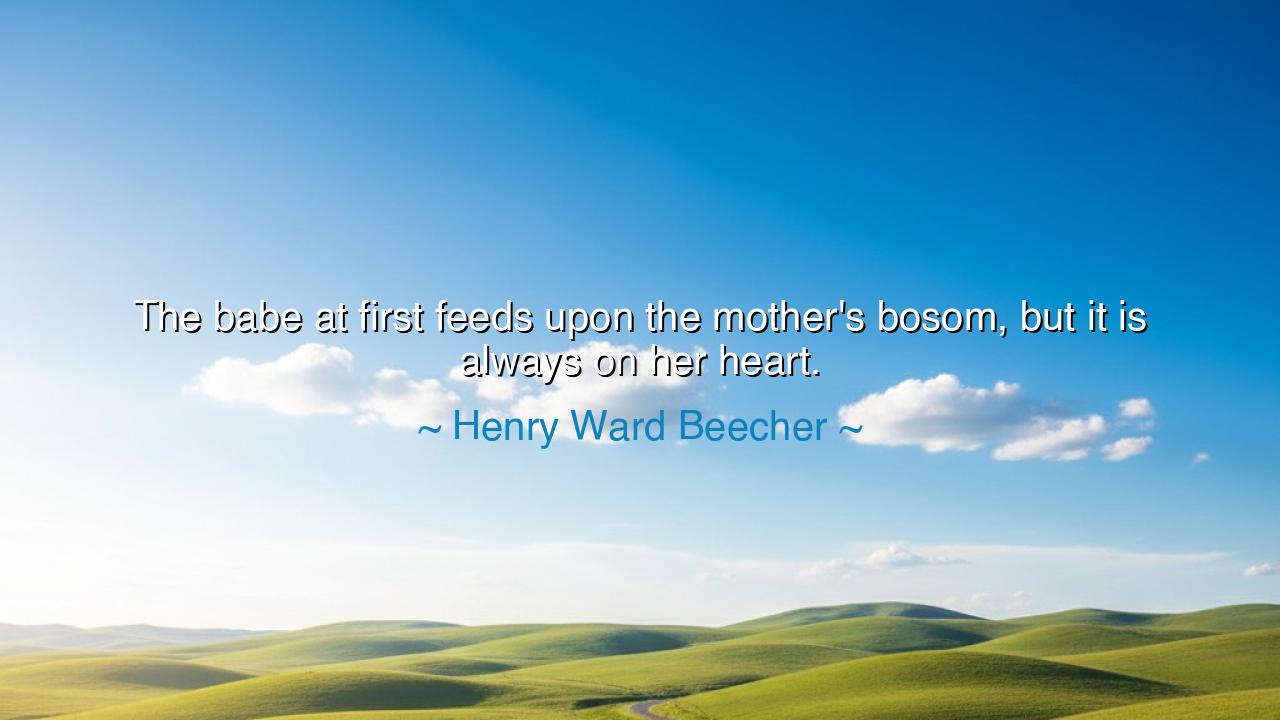
The babe at first feeds upon the mother's bosom, but it is always






Hear the words of Henry Ward Beecher, the great preacher of the nineteenth century, who spoke with fire and tenderness alike: “The babe at first feeds upon the mother’s bosom, but it is always on her heart.” In this utterance lies the secret of the eternal bond between mother and child. For though the babe receives nourishment from her body in the earliest days of life, it is the unseen sustenance of the heart—the love, the care, the constant devotion—that sustains the child forever. The milk of the bosom nourishes the flesh, but the warmth of the heart nourishes the soul.
The ancients knew that life begins not merely with breath but with love. A mother’s bosom is the first temple, the place where weakness finds strength and dependence finds protection. Yet Beecher reminds us that even when the child grows beyond the bosom, the invisible bond remains, for the child never ceases to rest upon the mother’s heart. This heart becomes a second cradle, one that never releases the child, no matter how far he travels, no matter how many years pass.
Consider the story of Mary, mother of Jesus, as told in the sacred texts. She nursed the infant in Bethlehem, but her devotion did not cease when the child grew. At Cana, at Jerusalem, even at the cross, he remained ever upon her heart. The world saw a man; she saw her babe, still bound to her through love. Thus Beecher’s words echo even in holy history: the nourishment of the body is fleeting, but the sustenance of the heart endures unto eternity.
History, too, bears this truth in countless lives. Think of Thomas Edison, whose teachers called him slow and unteachable. It was his mother, Nancy Edison, who refused to abandon him. She taught him at home, encouraged his curiosity, and believed in him when no one else would. He had long ceased to feed upon her bosom, but he never ceased to live upon her heart. That hidden devotion shaped the man who would bring light to the modern world. Such is the power of the unseen nourishment of love.
The meaning of Beecher’s words is therefore clear: physical care may cease, but spiritual care is everlasting. The babe grows, becomes a youth, becomes an adult, yet he carries forever the imprint of the mother’s heart. Her sacrifices, her hopes, her prayers—these become the invisible sustenance of his life. Even when her body is no longer present, her heart continues to live within him, guiding him, shaping him, reminding him of who he is.
The lesson for us is profound: to mothers, know that the love you pour into your child outlasts the years of infancy. Do not underestimate the power of your devotion, for it becomes the unseen foundation of their destiny. To children, remember that you are always upon your mother’s heart—that even if her voice is silent, her love yet speaks within you. Honor that love by living with gratitude, with courage, and with compassion.
Practical action flows naturally: express gratitude to your mother not only for the sacrifices of your childhood, but for the continual presence of her heart in your life. If she lives, speak words of love while there is still time. If she has passed, carry her memory not with sorrow alone but with reverence, embodying the virtues she instilled in you. And for those who are mothers themselves, let Beecher’s words remind you that your task does not end with the feeding of the body; your greatest work is the feeding of the soul through love.
Thus Beecher’s wisdom endures: “The babe at first feeds upon the mother’s bosom, but it is always on her heart.” For though bodies grow and seasons change, the heart of the mother remains the eternal source of nourishment, a fountain of love that never runs dry, a cradle that never closes.






AAdministratorAdministrator
Welcome, honored guests. Please leave a comment, we will respond soon